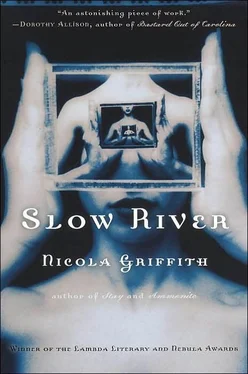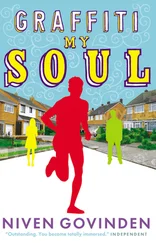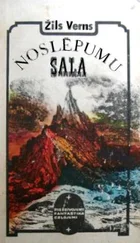Outside, adjusting to the bright afternoon after the dim warmth of the bar, I hesitated. Those two were trouble. Maybe Spanner was too desperate for what they were offering to notice the casual hardness of their faces, the way their eyes had flickered automatically over the room looking for exits, checking for weapons.
I waited outside for nearly ten minutes before I realized I could do nothing to help. I left reluctantly, wondering why—after all she had done—I still cared.
Lore is five. Tok and Stella, the twins, are nine. They have been playing in the fountain in an Amsterdam neighbor’s gardens. Lore has tried to catch the upspouting water in her mouth.
Tok is shouting at her. “Don’t you want to know what it is that you’re drinking?”
“It’s water,” she says, puzzled.
“How do you know it’s clean?”
“But it’s always clean.”
“This is clean,” he says, “but it isn’t everywhere.” Lore hardly listens at first. His eyes are bright and fierce, an almost turquoise blue, like the sky first thing in the morning when the day will be burning hot. Like the eyes of their father, Oster, when he is excited. But then Tok pulls up facts and figures on water contamination incidents over the last thirty years and Lore listens in horror. “All it takes is one sip of some of this stuff, Lore, and then when you’re grown up, or as old as me, it’s leukemia, which means your blood goes yucky, or renal failure, that’s when your kidneys rot and don’t work anymore…”
She is frightened, but refuses to cry. Stella would mock her for weeks. “Does it hurt?”
“Of course it hurts!”
Lore does not go back to play in the fountain and that night she has nightmares of drinking swamp water full of dead rats, and she never forgets to test the water again. Even in the water– and air-filtered surrounds of the family holdings. Even on trips to luxury resorts in Belize and Australia. Even bottled water, because all it takes is one chemical spill in the groundwater table and the eau de source can be full of benzene—there and gone again in the blink of an eye, missed by the random testing. Never take anything for granted, her mother often says, and Lore never does. None of the family ever do. It is the company motto when Lore’s great-uncle patents the hundreds of genetically engineered micro-organisms that now are indispensable in the world’s attempt to clean up its own mess. It is what prompts the ever-careful van de Oests to guarantee future monopoly and profit by making sure their patented, proprietary bugs need their patented, proprietary bug nutrients. And Never take anything for granted prompts them to use the first gouts of cash to corner a piece of the nanomechanical remediation technology market, a corner that grows steadily for the next fifteen years.
The Hedon Road wastewater-treatment plant was on the east side of the river, the part of the city that grew during the Victorian era. The buildings were big and ugly: limestone, and sandstone partially eaten away by the corrosives in industrial soot.
I turned up at seven in the evening, and after a few perfunctory questions about name, age, and experience, the flunky showed me into a tiled locker room. He handed me a skinnysuit. “Get changed while I pull your record for Hepple.”
“But I’ve only come here for an interview.”
“You want the job, you talk to Hepple. You want to talk to Hepple, you wear this.”
He left with a shrug that indicated he did not care, one way or the other. At least I didn’t have to worry about the records. Sal Bird’s employment history was good enough for this job.
It was an hour after the change of shift and the room was empty, though from somewhere down a corridor I heard the beating slush of a shower. I wondered if they used water from the mains, or siphoned off their own effluent I smelled chlorine. The mains, then.
I stripped to my underwear, then sat on the wooden bench and pulled the skinny from its package. I was expecting cheap government issue and was pleasantly surprised by the slick gray plasthene. It was about a millimeter and a half thick—well within the necessary tolerances—and the seams were well made. I stepped into it, spent a couple of minutes wriggling my toes to get them in the right place, then hauled it over my hips and up to my shoulders. The smell of new plasthene on my skin reminded me of the sheet in the van, of dreams of blood and suffocation.
There was no easy way to skinny into these suits. You just had to squirm until everything was in the right place. I flexed my plasthene-covered hands, checked to make sure the roughed patches were at the tips of my fingers and thumbs. There were seals above the wrist for those jobs that needed the extra protection of gauntlets. I did a couple of deep knee bends to see if the neck seal would choke me.
It had been a while since I’d worn one of these, and then it had been specially made. I was surprised at how well this one fit.
No one had said anything about a locker so I settled for folding my street clothes into a neat pile on the bench. They were probably not worth stealing, and I had not brought a slate or a phone extension. They couldn’t trace you from what you didn’t carry. Old habits learned from Spanner.
A man wearing a tailored gray cliptogether over his skinny entered through the door marked Executive Personnel Only. His face was young and bland. A pair of dark goggles hung loose around his neck and his name tag read Johne Hepple. He checked his hand slate. “Ms. Bird? Sal Bird?”
I stood. “Yes.”
He looked me over. “Well, you know how to put on a suit, at least. I’m the acting shift supervisor.” He handed me a magnetized name tag. “You must wear this at all times. It’s also a miniature GC.”
I slapped it onto the magnet over my left breast. Sal Bird, age twenty-five, with two years’ experience at the waste-water depot of Immingham Petroleum Refinery would know that a GC was a gas chromatograph, and what it was for. Johne Hepple, though, was taking no chances.
“It’ll let you know if the atmosphere is contaminated to dangerous levels by changing color.”
“Industry standard?”
Hepple looked confused for a moment, then adjusted his expression to one of superior amusement. “Superior to standard, as is all the equipment used here.”
I nodded politely but mentally rolled my eyes. For now I’d just have to assume it used the standard color system, but if I got the job I’d make sure I asked another worker. If there was any kind of leak, I wanted to know exactly what I would be dealing with.
Hepple talked as we toured the plant. “The six city stations process more than twenty million gallons of household wastewater per day. The Hedon Road plant is the biggest, at between four and four and a half mgd.”
“Just household?”
He gave me a long look. “Of course.”
I nodded, trying to look satisfied. I just hoped that his reticence came from a feeling of superiority and not from ignorance. Household wastewater was anything but. It also included the runoff from storm drains. Which were prime sites for both deliberate dumping by waste-generating companies—large and small—and accidental spillage. Even if there was a spill in Dane Forest, forty miles from here, the contaminated water would find its way through underground aquifers to the city system. And those spills could be anything. Literally anything. I was glad that plants like these always had a large, specifically designed overcapacity. With people like Hepple in charge, we’d need it.
We climbed onto a catwalk over a hangarlike area where huge plastic troughs lined with gravel stretched into the distance. Bulrushes rocked and swayed in the water below. The air was snaky with aromatics and aliphatics. The workers below were not wearing masks but I said nothing. Sal Bird would not.
Читать дальше












